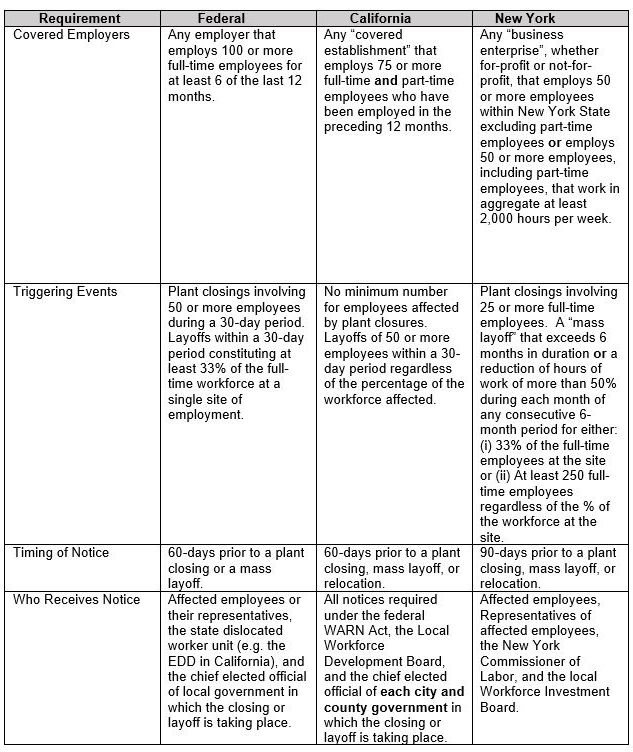With the news of the spread of COVID-19 changing faster than any of us can keep up with, one of the many questions facing employers is: What are their obligations to employees if they have to shut down workplaces temporarily, or permanently, as a result of the COVID-19 outbreak. Whether the shut-down is due to overall health concerns or because of an unexpected downturn in business caused by this unprecedented global pandemic, there are federal and state notice requirements that, if possible, an employer must provide to its employees as well as governmental agencies. These Workers Adjustment Retraining Notification (WARN) laws can be technical to navigate, but the failure to follow them can subject an employer to liability including civil penalties and potential lawsuits. Below is a summary of the general requirements of the Federal, California and New York WARN Acts:
With the news of the spread of COVID-19 changing faster than any of us can keep up with, one of the many questions facing employers is: What are their obligations to employees if they have to shut down workplaces temporarily, or permanently, as a result of the COVID-19 outbreak. Whether the shut-down is due to overall health concerns or because of an unexpected downturn in business caused by this unprecedented global pandemic, there are federal and state notice requirements that, if possible, an employer must provide to its employees as well as governmental agencies. These Workers Adjustment Retraining Notification (WARN) laws can be technical to navigate, but the failure to follow them can subject an employer to liability including civil penalties and potential lawsuits. Below is a summary of the general requirements of the Federal, California and New York WARN Acts:

Both the federal and New York WARN Acts have exceptions to their notice requirements if the closure or layoff was due to "unforeseeable business circumstances" or "natural disaster." While California, on the other hand, exempts from its notice requirements certain industries (such as the motion picture industry and seasonal employment) where the employees were hired with the understanding the work was limited in duration, it also has an exception for closures that are due to "physical calamity." Whether closures due to COVID-19 qualify as exceptions for an "unforeseeable business circumstance", "physical calamity", or "natural disaster" is unknown. However, all three laws apply only when an employer orders a mass-layoff or plant shuttering, not when the closing is at the direction of the federal, state, or local government.
Given all the uncertainties during this time, the best practice for employers facing mass layoffs or plant closures is to give employees as much notice of a lay-off or closure as soon as reasonably possible.
This alert provides general coverage of its subject area. We provide it with the understanding that Frankfurt Kurnit Klein & Selz is not engaged herein in rendering legal advice, and shall not be liable for any damages resulting from any error, inaccuracy, or omission. Our attorneys practice law only in jurisdictions in which they are properly authorized to do so. We do not seek to represent clients in other jurisdictions.

